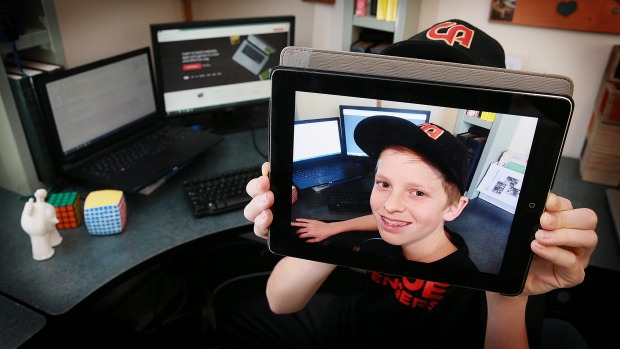Oceanía/Nueva Zelanda/17 de Julio de 2016/Autor: Te Ahua Maitland/Fuente: Stuff
RESUMEN: Codificación, Depuración de Errores, HTML, algoritmos y programación pueden sonar como una lengua extranjera a la generación más antigua de Nueva Zelanda.
Pero para los niños de hoy dia , no tanto. Y llegado el año 2018, los niños de la edad de cinco años serán aún más diestros en la tecnología digital si el tema se añade al plan de estudios nacional. El Ministerio de Educación anunció el 7 de julio que se cubrirá seis temas, con el diseño aún no se ha finalizado. Mateo Walmsley, 13, es un buen ejemplo de los niños conozcan codificación a una edad temprana. El interés del estudiante Tai Wananga Ruakura en la codificación se despertó cuando tenía sólo ocho través de “Vengadores” un código de negocio de su hermano en Hamilton. «Hice la codificación, por lo que implica HTML, CSS, diseño y ese tipo de cosas.»
También ha ayudado a los maestros con problemas de tecnología y piensa que es una gran ventaja para empezar a enseñar la tecnología digital desde el primer año.
«Creo que todas las cosas de la tecnología digital ayuda a los niños con la resolución de problemas y el pensamiento de nuevas maneras», dijo.
Coding, de-bugging, HTML, algorithms and programming may sound like a foreign language to the older generation of New Zealand.
But for children, not so much. And come 2018, children from the age of five will be even more drilled on digital technology with the subject being added to the national school curriculum.
The Ministry of Education announced on July 7 the subject will cover six themes, with the layout still to be finalised.
Matthew Walmsley, 13, is a prime example of kids getting into coding at a young age.
The Tai Wananga Ruakura student’s interest in coding was piqued when he was just eight through his brother’s business Code Avengers in Hamilton.
He sometimes works for the company in the school holidays; validating courses, writing code, and setting up web pages.
«I’ve always really liked math and numbers, and creating things and Lego and Connect,» he said.
«So you put those two together, I enjoy creating things involving lots of numbers and on computers.»
Last year, while he was still at intermediate, Walmsley and his group gave a presentation on artificial intelligence, and he made a website.
«I did the coding, so that involves HTML, CSS, design and that kind of thing.»
He’s also helped teachers with tech problems and thinks it is a great advantage to start teaching digital technology from Year One.
«I think all the digital technology stuff helps kids with problem solving and thinking of new ways,» he said.
«It will help a lot, especially now things are becoming more online.»
Chief executive of Orion Health, Ian McCrae, said in order for the subject to work in schools, it needs to be taken seriously.
He said it is positioned in the «less academic» subjects, such as food technology, fabric technology, wood and metal work.
«It needs to be placed in the same category as your historically academic subjects such as maths, English, chemistry, physics,» he said.
«Look at the Year 13 curriculum, you can get six credits for making a cream puff for food technology.»
He believes the sector is generating about 3000 jobs a year, and only 1500 are coming out of the education system.
«To be successful in life we have to be fluent in English, or have good English skills. But being tech literate is increasingly becoming important. You cannot succeed today if you’re not technologically literate. In any field.
«We’re directing our kids into areas where there are far less job opportunities. The digital technology sectors are heading towards being the second largest exporter after dairy.»
But if teachers do not get the resourcing and training they need, they will end up being in a «big puddle», New Zealand Association for Computing, Digital and Information Technology Teachers member, Gerard MacManus said.
He said a third of New Zealand students are not taught by a qualified maths teacher in their first year of high school.
«Are we going to see the same thing happen with digital technologies? Because at the moment we don’t have the teachers.»
The secondary school teacher said he knows of technology teaching jobs that have been advertised for a year at least.
But his main concern was for the primary and intermediate school teachers.
«Who is going to help them to teach digital technology from Year One?
«We need to make a meaningful context from when it is integrated at the lower levels, for kids to fin interesting, creative ways to use it.»






 Users Today : 289
Users Today : 289 Total Users : 35459884
Total Users : 35459884 Views Today : 464
Views Today : 464 Total views : 3418436
Total views : 3418436